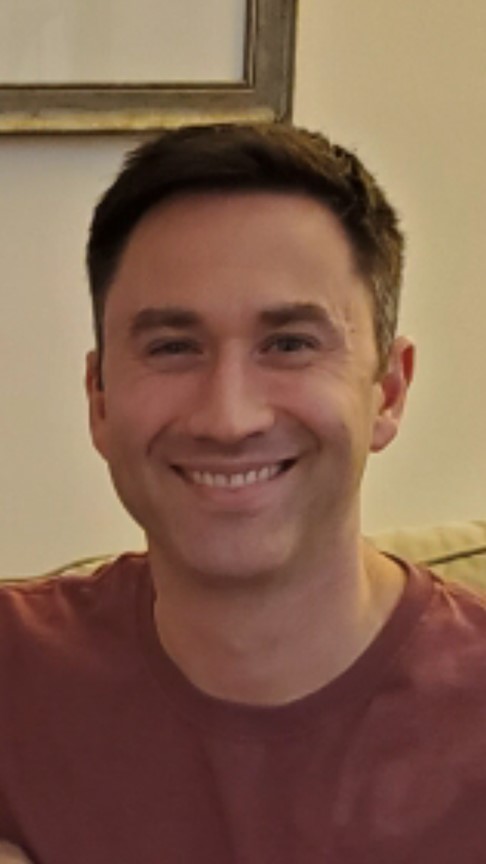By Justin Neff
With nervous energy, the wind whipped across the freshly cut hay field, forming jagged funnels from the day’s remnants, and filling the air with the scent of forgotten earth.
Mrs. Cunningham stood at the foot of her crooked porch steps. At such a late hour, she had been drawn to the damp grass by a voice inside her head that was not her own. Her hair, tragically red in her far-off youth, now translucent or gone, danced madly atop her head, electrified by the unseen wind. A gust of black tore at her wispy nightgown, but she stood firm in the face of the coming darkness. Her nipples, not hardened in years, sharpened against the pressure of nature’s embrace.
Flashes of light burst from above and struck a match to the milky sky. A line of violent yellow, then another, stabbed the field. Uncut grass fell upon her feet and clawed up her bare ankles, her skin so thin, the blades like razors against her flesh.
A hand, soft and gentle, but large enough to grasp a watermelon, fell upon Mrs. Cunningham’s shoulder. Her skin warmed and a smile formed below the wrinkles on her face, but she did not turn from the storm.
“Like the one on the night Sammy was born,” said Harold, his voice diluted by the swirling air. “That one wouldn’t quit. Thought the damned roof was gonna fly off.”
“You always thought the roof was gonna fly off,” said Mrs. Cunningham.
“And it did,” he said.
“It did,” she said. “’Cause you was too lazy to fix it.”
Thunder announced its presence with a deep-throated yell from above. Mrs. Cunningham squinted at the flash that followed, her eyes too sensitive for vicious change in illumination. The cries of her first-born son mixed with the claps from the heavens. If only the boy knew the hardships that lay ahead for him. Happiness is pursuable, but it’s no guarantee.
His hand lightly squeezed the exposed flesh just below her neck. “I wasn’t the perfect man. But I loved you and them boys as best I knew.”
The rancid smell of a day’s drinking made her stomach turn. Harold’s shouts. And demands. Threats to leave them broken and alone. The bubbled vein across his forehead. She shivered in remembrance and folded her arms tight to her ribs. Yet there too was Christmas morning. A tree so full and bright it could be seen from town miles off. His arms around her. Playing his guitar and singing to the boys deep into summer nights. Protecting them from what they didn’t know.
There were times, rare as they were, when the children slept and the chores done, that Mrs. Cunningham drank more than one glass of brandy. As the second dose lessened what she knew to be true, she questioned where love ended and dependence began. Somewhere, she was certain, there were others being themselves. Not mom. Not wife. Just a person. But in the morning, when life started again, she no longer had the luxury of those thoughts. Only a dry mouth and a headache and chores.
Mrs. Cunningham lifted her chin to the storm. “I haven’t the energy to sort good from bad, Harold. It’s all the past.” She turned to look, to tell him all had been forgiven or forgotten, but he had gone. Vanished, as he always did. In her line of sight, the house, her home for eighty-seven years. Its tired stone walls tilted uphill, as though tacking into the coming wind. It looked meek, dwarfed by the subdivision that started at her front yard and spread across what had been her family’s farm. Houses so large their unused chimneys cast shadows across her front porch on winter mornings. They, the ominous they, had wanted the house gone too, but Harold refused. “I owe it to my wife’s father, dead as he is, to save his home. Even though he always was a son of a bitch.”
Darkness stormed forward, as though pulled by a pack of foaming stallions. She blinked her eyes, but it did little to focus them. The reins of her memory were severed, and it was pushed and pulled by each passing gale. Goosebumps rippled across her arms.
Darkness stormed forward, as though pulled by a pack of foaming stallions. She blinked her eyes, but it did little to focus them. The reins of her memory were severed, and it was pushed and pulled by each passing gale.
Another hand on her shoulder. Timid, unsure of itself. She ignored it, not feeling as though it deserved her attention.
“Mrs. Cunningham,” she heard. The hand, loose-fingered, again on her shoulder. “Excuse me, uh, Mrs. Cunningham. You good?”
She turned to see Sean, her neighbor of the oversized house next door. His cheekbones shimmered from a day of golf and beer, and he wore a raincoat and a pair of khaki shorts, both of which appeared to be pulled on in haste. The spotless, name-brand galoshes came up to just below his knee. His halting gaze alternated between Mrs. Cunningham and the dense blackness of the sky. She smiled with only her mouth. Sean smiled back and checked over his shoulder, as though receiving direction from behind the drawn curtains.
“Probably a good time to get inside, huh?” he half asked. He nodded toward the storm, the fringes of his thin lips shaking in the wind. “They just gave a tornado warning for the county. Or a watch. One touched down over in Reading.”
His words mushed into a sound that didn’t matter to Mrs. Cunningham. Soon after Sean and Liz moved in, she’d watched from her open window as Sean kicked their golden retriever for going to the bathroom on the porch. Mrs. Cunningham, her hearing weak, heard the air rush from the dog’s lungs. For the rest of that afternoon the canine cowered in the corner of the yard, coming out only when Liz held a bone beneath its nose. The next week, Mrs. Cunningham hammered a nail into the tire of Sean’s Range Rover. Twice. He called the police, who arrived with the enthusiasm to solve the mystery of the missing Lindberg baby. Two square-jawed patrolmen questioned every neighbor through narrowed, unblinking eyes. The second time, to throw any possible suspicion off her, Mrs. Cunningham hammered a nail into her own tire as well. She called the police at the break of dawn and gave the description of a man that could have been Sean’s twin brother. It ended there, as the anger bored her.
“Thanks, dear,” said Mrs. Cunningham, her few teeth barely separating. “You be sure to give my best to your wife.” She did not wait for a response and returned her attention to the west.
Sean shifted on his feet. He plunged his hands into his pockets and sulked back across the trembling grass.
A siren rang out. Then another. Less and less time passed between the blinking light from above. Mrs. Cunningham widened her stance to keep from being toppled over.
Even before Mrs. Cunningham heard the voice, she felt her presence. Next to her. Inside her. For as long as she could remember, it had been that way. As a girl, without fail, the hairs on her arm would stand up a full five seconds before her mother walked in the room. In the dead of night, whether during a storm like this one or from a nightmare too vivid to be shaken, there was never a need to call out for her mother; her mother would be at her bedside, pressing a cool hand to her forehead. Her mother was there when Mrs. Cunningham lost the first baby. The elder woman held her daughter in her arms as Mrs. Cunningham’s sobs shook the bed. “What will I tell Harold?” Her mother squeezed her tighter. “Tell him to ask God for those answers. And then you will make supper.”
“Do storms still terrify you?” asked her mother, the woman’s voice strong and clear, years younger than Mrs. Cunningham herself.
Mrs. Cunningham allowed her eyelids to slide together as the air hammered against her eardrums.
“Everything terrified me, Mother,” she answered. “But that’s okay, isn’t it?”
“There comes a time, Cathy, when everything is okay.” She held a hand to her daughter’s forehead.
Mrs. Cunningham worked her toes deeper into the soft grass. Raindrops, heavy and plump, fell upon her head and shoulders. She looked toward the heavens and allowed them to explode on her forehead and cheeks.
“I am tired, Mother.” Mrs. Cunningham opened her arms, the wind nearly lifting her off the ground. “Yet free.”
“You have paid a lifetime for that freedom,” said her mother.
Mrs. Cunningham’s mother watched as her daughter, fraught with the ailments of age and life, spun in the grass, her arms wide at her sides. Both women laughed, their wafer-thin cheers drowned by the hounding wind.
“And my fear?” asked Mrs. Cunningham, wiping rain and joy from her eyes. “Where has that gone?”
“It has gone the way of all your troubles.” Her mother reached out her hand. “This is your time, my sweet girl.”
Wasting not a minute, the daughter placed her hand within her mother’s youthful grip. They walked. Using only the effort of her mind, Mrs. Cunningham followed as her mother led them through the high grass that separated the yard from the field. Though the freshly tilled soil at the grassland’s edge was tender and loose below her feet, her lightness barely made footprints in the dirt. They continued to walk. Together, hand in hand, the two women moved unflinchingly toward the marching squall, just as the faint outline of a tornado’s funnel spilled from the blackness above.

Justin Neff lives in Philadelphia with his wife and their two young children. After surviving eleven years as a high school teacher in Phoenix, Arizona, Justin decided to change both careers and geographies, and is now a transportation planner (though first he was a 34-year-old intern with graying hair).
When not washing dishes, playing Frozen or Paw Patrol, or getting his fingernails painted by his daughter, he writes. Justin’s work has appeared in McSweeney’s, Points in Case, and Memoir Magazine.



